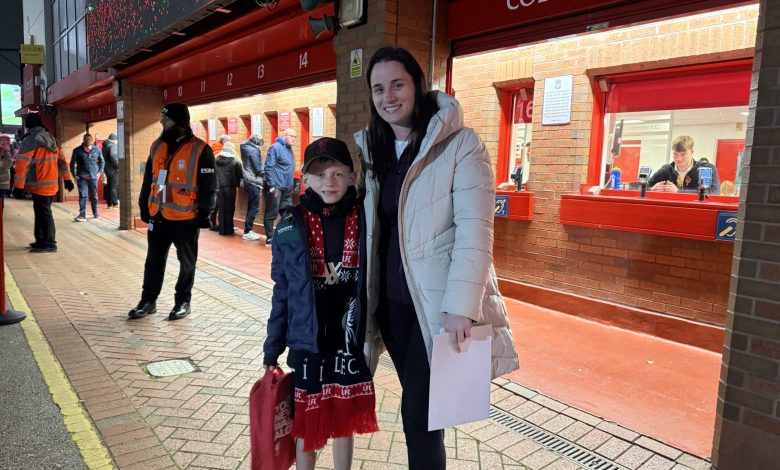An English Soccer Giant Is Being Targeted by Organized Crime. Now It’s Fighting Back.

A mother wipes away tears outside Anfield as she comforts her young son on a bitterly cold night.
Liz O’Driscoll, who has travelled to Merseyside from County Kerry in Ireland with eight-year-old Liam, has just been informed by Liverpool staff that the two tickets she bought for the Premier League game against Aston Villa are fake.
“We got to the scanner at the turnstiles and the light went red rather than green, so they sent us here to the ticket office,” she says. “I got them through the grapevine in Ireland. This fella said he knew someone who could sort it and put me in touch with him.
“I paid £200 through a banking app two months ago and the same day, he sent me the tickets via a link on a WhatsApp message. He talked me through how to save them into the wallet on my phone and other fans I showed them to on the bus earlier said they looked genuine.
“Now I’ve been told they’re duds. I’ve repeatedly tried ringing him but his phone is turned off. It makes me feel so cross. This is Liam’s first trip to Anfield and he’s been talking about nothing else for weeks. That’s why I’m so emotional.”
Liz O’Driscoll and her son Liam, who were the victims of a ticket-touting scam (James Pearce/The Athletic)
In the hour leading up to kick-off, there is a grim succession of similar tales from supporters who have been ripped off.
“I can’t believe this is happening,“ says Dylan Williams, who had driven for five hours from Porthcawl in South Wales with two friends after buying from a secondary ticketing site. “They just told me we’ve been scammed. I’m so gutted. £270 each down the drain. People who do this need to go to ****ing jail. They’re ruining people’s lives.”
A steward standing nearby in a fluorescent jacket shakes his head. “It used to be the case that you’d only see this type of thing when the really big games came along but now it’s happening every single home match,” he says. “It’s getting worse and worse.”

GO DEEPER
When fans visit Anfield for the first time: ‘It was hard to hold back the tears’
With Arne Slot’s Liverpool side top of the Premier League, leading the way in the Champions League and in the semi-finals of the Carabao Cup, there is a buzz of excitement around Anfield.
The redevelopment of the Anfield Road Stand may have lifted the stadium’s capacity beyond 60,000 last year but the demand for seats still far outstrips supply.
Liverpool have 28,000 season ticket holders and a further 11,000 tickets per game are hospitality seats. Visiting teams receive around 3,000 tickets, with the rest sold to members (who pay an annual fee of between £37 and £46) via a ballot.
The season ticket waiting list has been closed since 2017. Some of those who finally got the call when the redevelopment was complete had been on it for over 25 years.
With so many fans having little hope of obtaining general admission tickets through official channels, touts are capitalising as they illegally sell genuine tickets at hugely inflated prices. Others are fraudulently selling fake or cloned tickets, with Liverpool’s data showing that international supporters, many of whom are trying to visit Anfield for the first time, are being particularly targeted.

The redeveloped Anfield Road Stand has increased Liverpool’s capacity to over 60,000 (Nick Taylor/Liverpool FC/Liverpool FC via Getty Images)
The move from paper to digital tickets in recent years has arguably made it even easier for touts to operate as they no longer have to hang around Anfield on matchdays. Now, the touting operation has become an increasingly sophisticated, multi-million-pound operation, involving organised crime gangs both on Merseyside and further afield.
Liverpool discovered that gangs had been trying to infiltrate their ticket office by applying for jobs at Anfield and have also attempted to intimidate club employees in order to access tickets. In July and November 2024, online sales for members were subjected to sustained cyber attacks which were designed to illegally harvest tickets.
Now, Liverpool are fighting back. Last season, the club shut down close to 100,000 fake ticketing accounts following suspicious online activity, cancelled 1,500 tickets, and issued 47 lifetime bans and 136 indefinite suspensions.
So far this season, they have deactivated just under 20,000 ticketing accounts, cancelled 1,200 tickets, and issued 47 lifetime bans or indefinite suspensions. That final figure is expected to be a lot higher come May as a host of investigations continue.
Liverpool have three permanent members of staff dedicated to touting and sanctions regarding stadium and online behaviour. They are supplemented by a matchday touting response team of stewards.
Resources are being ploughed into data analysis which helps to flag anomalies when it comes to sales and distribution with greater verification checks on which accounts receive tickets.
Given the organised crime element, club staff leading the fight do not want to be named but some spoke to The Athletic under the condition of anonymity to lay bare the extent of the problem.
Liverpool are aware that a number of touts operate with burner phones rather than actually forwarding tickets to buyers. One scheme involves fans having to hand over their passport in return for a phone which has a ticket on. A post-match meeting point is then arranged for them to swap back.
Other touts are even more brazen and will actually scan buyers in at the turnstiles. They don’t want to forward tickets on as they would lose the credit for future sales.
As a result, it is difficult to put an accurate number on how many seats inside Anfield are being touted but club officials believe it runs into the thousands for each home game.
Since the Criminal Justice & Public Order Act in 1994, it has been illegal under UK law to sell or offer to sell tickets to football matches in England and Wales without the authorisation of the organisers. Liverpool work closely with Merseyside Police to seek criminal convictions for those caught doing so.
Prior to last month’s Premier League match against Manchester City at Anfield, a man suspected of being involved in ticket touting was stopped by officers outside the stadium and found to be in possession of around £2,800 in cash, which was seized. He has since been released under investigation as enquiries continue.

Police are alert to ticket touts operating around Anfield (Oli Scarff/AFP via Getty Images)
Chief Inspector Chris Barnes told The Athletic: “We will always take action to protect genuine fans who fall victim to touts when all they are trying to do is simply purchase tickets to support their team.
“Ticket touts want to exploit passionate fans to line their own pockets — and it won’t be tolerated by Merseyside Police. We believe the majority of ticket touts target visitors to the city who have little or no experience in purchasing tickets, so may not be aware that the prices they are paying are vastly inflated or that the way they have been sold is illegal.
“Ticket touts will also try to sell invalid or forged tickets, with fans turned away at the gates with no option to get their money back. Our activities to target touts operating both online and on matchdays will continue.
“Liverpool welcomes many thousands of tourists every year and we are determined to ensure that those who come to our city have a safe and enjoyable time protected from such fraud. Our advice to football supporters is clear: don’t buy from ticket touts.”
The club have been assisting with two major ongoing fraud investigations involving the sale of Liverpool tickets — one with Merseyside Police and another with North Yorkshire Police. The combined proceeds of those alleged frauds is estimated to be around £8million.
Conducting a test purchase with one website enabled Liverpool to establish who was behind it before they passed information on the police. It turned out those involved had set up hundreds of individual ticketing accounts within the club’s online systems.
There is a sense of frustration among club staff about the slow nature of the criminal justice system in the UK. They believe the sentencing guidelines do not act as a sufficient deterrent given the sums of money involved.
Last August, two Merseyside men, John Stuart and Greg O’Neill, were found guilty at Liverpool Crown Court for defrauding fans out of thousands of pounds prior to the Champions League final against Real Madrid in Paris in 2022. Stuart was jailed for eight months and O’Neill was given a two-year community order.
In October, John Gill, from the Liverpool suburb of Fazakerley, was sentenced to 17 weeks in prison after pleading guilty to selling two fake tickets outside Anfield prior to Jurgen Klopp’s farewell game against Wolverhampton Wanderers in May.
Liverpool are considering a change of tactic by going down the route of civil action in the form of asset recovery as they look to hit touts in the pocket.
One major headache for the club is secondary ticketing sites registered abroad, and therefore outside of the UK’s jurisdiction if tickets are fake.
A number of tickets for this Sunday’s meeting with Manchester United are being advertised on Madrid-based LiveFootballTickets.com. A seat in the Anfield Road Stand, with a face value of £50, is on sale for £349 — plus a ‘service fee’ of £104.70, the total cost comes to £453.70.
It is the same site that Dylan Williams and his two friends say they bought tickets from for Liverpool’s home game with Aston Villa in November. They paid £270 each but then learned that only one of the three tickets was genuine.
“We got sent a link which brings up this QR code on a members card,” explains Dylan’s friend David Davis. “It looks legit but the staff in the ticket office have told us they’re fakes. I’m furious. Someone has made some serious money off us. We’ll have to find a pub to watch the game instead.”

The fake ticket sold to Dylan, David and their friend, via a mobile phone app (James Pearce/The Athletic)
After being approached by The Athletic, LiveFootballTickets.com said in a statement: “We can assure you that any tickets purchased with us are valid and genuine. We do not work with any ticket suppliers that provide fake tickets.
“We have been online for over 15 years, serving fans from all over the world. We have over 5,000 reviews on TrustPilot, with the vast majority being excellent.
“In the highly unlikely case you do not receive the tickets you ordered in time for the match or you have any problems with the tickets, and it’s the seller’s fault, we will refund 100 per cent of your money, plus we will offer you a credit worth 50 per cent of your original purchase towards another match. Every seller on our website is vetted and approved by us.”
Asked how they could justify tickets being sold at 10 times the face value, they added: “We are an online marketplace. We do not list any tickets, we allow other people to list tickets and set their own prices.
“Availability and prices are driven by market demand. They are not determined by LiveFootballTickets.”
Liverpool are regularly seeing apps that replicate the appearance of genuine tickets — fooling not just first-time visitors to Anfield.
There have been examples this season of fraudsters selling the same ticket up to a dozen times. The first of those fans to try to access the stadium gets in but for the others, there is just a sinking feeling as the red light flashes when their ticket is scanned at the turnstiles.
Liverpool have contacted social media companies in the hope they would help combat scams being run on their sites but they have shown little interest in joining the fight.
There is a dedicated page on the club website where fans are asked to report touting and the regular bulletins staff receive make heartbreaking reading. Earlier this season, a family of four flew over from Belfast for a child’s birthday and paid £800 per ticket. They were all fake. With the game completely sold out, there was nothing ticket office staff could do.
Liverpool have invested more funds in online security and put new tools in place.
They established that the sale of 500 £9 tickets for each home match to fans with an L postcode (a policy designed to help local fans access games) was getting “absolutely destroyed by touts”.
At times last season, there were up to 85,000 ‘people’ entering each of those ballots. Liverpool decided to change the rules so that the same payment card could not have more than four accounts attached to it. The number in the ballot for the next home game dropped to just 6,000 as life was made more difficult for the touts trying to hoover up tickets.

Liverpool are trying to ensure local fans get authentic tickets (Alex Livesey/Getty Images)
Now there is a two-day registration period before the local general sale, which gives the club’s data analysts the opportunity to assess who has signed up.
On the day that Slot’s side played Real Madrid in the Champions League in November, Liverpool cancelled 200 tickets which they believed had been accessed by touts with numerous accounts.
“Do you know how many of those affected contacted us to ask why? It was single figures,” reveals one staff member. “If I’m a genuine LFC fan and you’ve cancelled my ticket for Real Madrid, I’d be furious. Even those who got in touch asking what was going on, once we asked for some ID so we knew who we were talking to, they backed off and we didn’t hear anything else.”
Off the field, Liverpool have joined forces with Premier League rivals Manchester United, Chelsea and Arsenal in the fight against touting. Meetings have taken place this season with the sharing of data and information about what is working for each of them in terms of controls on accounts and online sales.
“We won’t eliminate touting but I believe we can get to a position where it’s marginal and we’ve got buy-in from senior executives with the resources to try to achieve that,” the Liverpool staff member adds. “A lot of things have to happen to get there but we have a duty to protect the wider fanbase.”
As for Liz O’Driscoll, having been conned out of £200, someone overheard her story and was able to sort out two tickets at face value for the game against Villa.
“I’m just so relieved for Liam,” she says. “He’s so happy he’s going into Anfield for the first time. I know other people sold fakes haven’t been as lucky.
“How do these people sleep at night having ripped people off?”
(Top photos: Getty Images; design: Eamonn Dalton)



